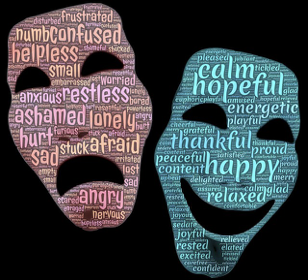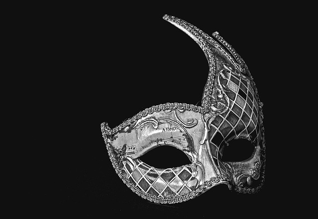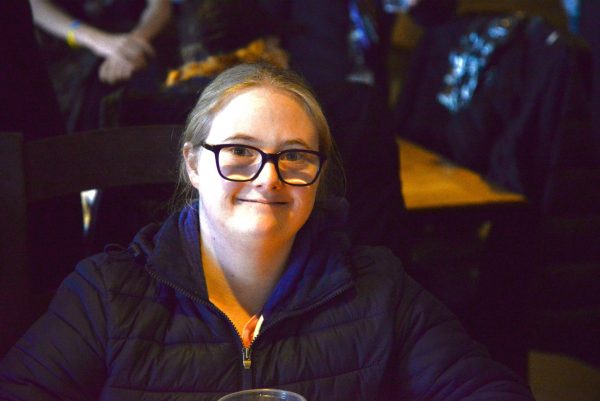Secrets Hide in Plain Sight
January 27, 2017
We are all wearing masks.
It’s normal to find yourself in a situation where you are wearing a mask in order to protect yourself. This mask is called a false self, and it is not necessarily bad. There are only two real problems with hiding your true self: how you may feel while wearing it, and losing your true self to your false self.
The false self is developed during childhood because children learn to “alter [their] behaviour, repress [their] feelings and push [their] needs aside to fit in with others,” according to author and life coach Hannah Braime.
Fitting in is the main reason people hide their true selves. According to an informal anonymous survey of 83 HHS students, 69 percent of students said they hide things from their friends, and 74 percent said they hide things from their family. The overwhelming response to why they hide these things is fear of judgement.

According to Braime, this fear causes people to protect themselves the only way they know how: by hiding things. According to survey fill-in responses, students hide emotions, sexual orientation, personality, sense of humor, and much more.
Braime said the hidden characteristics are what people believe will challenge their social status or perceived worth. Although hiding certain personal details is normal, hiding one’s true self can lead to inauthentic feelings.
Masking reality can even feel unethical, according to a study published in Psychological Science. Researchers found that false personas led to feelings of impurity while truth caused positivity. Therefore, living authentically is emotionally better for emotional and mental health. Positivity from being the natural, true, authentic self could translate into positive relationships.
However, psychologist Tian Dayton said that revealing true characteristics may cause misunderstandings, which can lead to negativity and strain to some relationships.
Although, Dayton believes completely hiding one’s true self is not the answer.
One anonymous HHS student believes that concealing oneself negatively impacts mental health and the ability to be honest with others in the future. “It can ruin your relationships with people, even when they don’t know you’re keeping something from them.”
This source’s belief is supported by psychologist Sarah Newman, who said the more we deny our true selves, the more it hurts us in the long run. According to Newman, consistently thinking that goals will never be achieved leads to the feeling that a true self is a secret shame that causes guilt to build.
Guilt is not healthy for anyone and not easy to overcome. Newman recognized that being your true self was not always easy, but Newman’s personal false self caused anxiety to build up and take over her mind.
Besides feeling anxious, immoral, or inauthentic while wearing a false self, the other danger is losing ourselves completely. Dayton has been studying the effects of losing the true self to a false self.
Losing the true self is essentially “[hiding] our true self so effectively that even we can’t find it,” wrote Dayton. Sometimes the true self can be seen as too weak, so we use our “strong” false self to cope with what is going on around us.
The false self is a coping mechanism to protect the true self from the painful wounds of reality as well as a way to make the person or family look good and normal, Dayton said. Therefore, people hide. Children learn to hide their true feelings. Families learn to act normal. But the longer a person acts from their false self, the more they lose their true self in the process.
Once the true self is lost, it is very difficult to get it back. A false self may seem to be your true self instead of just a mask.

Recognizing the false self can be hard. Dayton wrote that “the person with the false self would never know that it’s false and if you were to challenge them on it, they would see you as the problem, not themselves.”
If someone does manage to recognize their false self, the true self would not appear for a long time. The person may even have to enter therapy to become comfortable in their own skin.
Their coping mechanism, the false self, would have to be destroyed. This would reveal the reason the person put up the mask in the first place, which often comes with a lot of emotional wounds and scars.
However, Dayton said that over time, “…new emotional habits get created and new ways of healthy coping get practiced and adopted.” Then, the person can become comfortable with who they really are once again.
As dangerous as it is, the false self is a normal coping mechanism. In contrast with Dayton, Laura Schenck, a psychologist at the University of Northern Colorado, said that a false self can be beneficial if it is in balance with the true self. Protecting our true self with a false self allows avoidance of rejection or hurt, but it can also keep us from having genuine connections with other people.
The way to balance the true and false selves is to be aware of when you are using a false self. Schenck said that awareness of false selves and preserving the true self justifies having different masks. She believes that having a choice and controlling if and when the false self is shown is the key to balance.
“When we choose to show [the false self], it is no longer foreign and detached: our social masks become congruent and integrated,” she said, “We are whole.”




